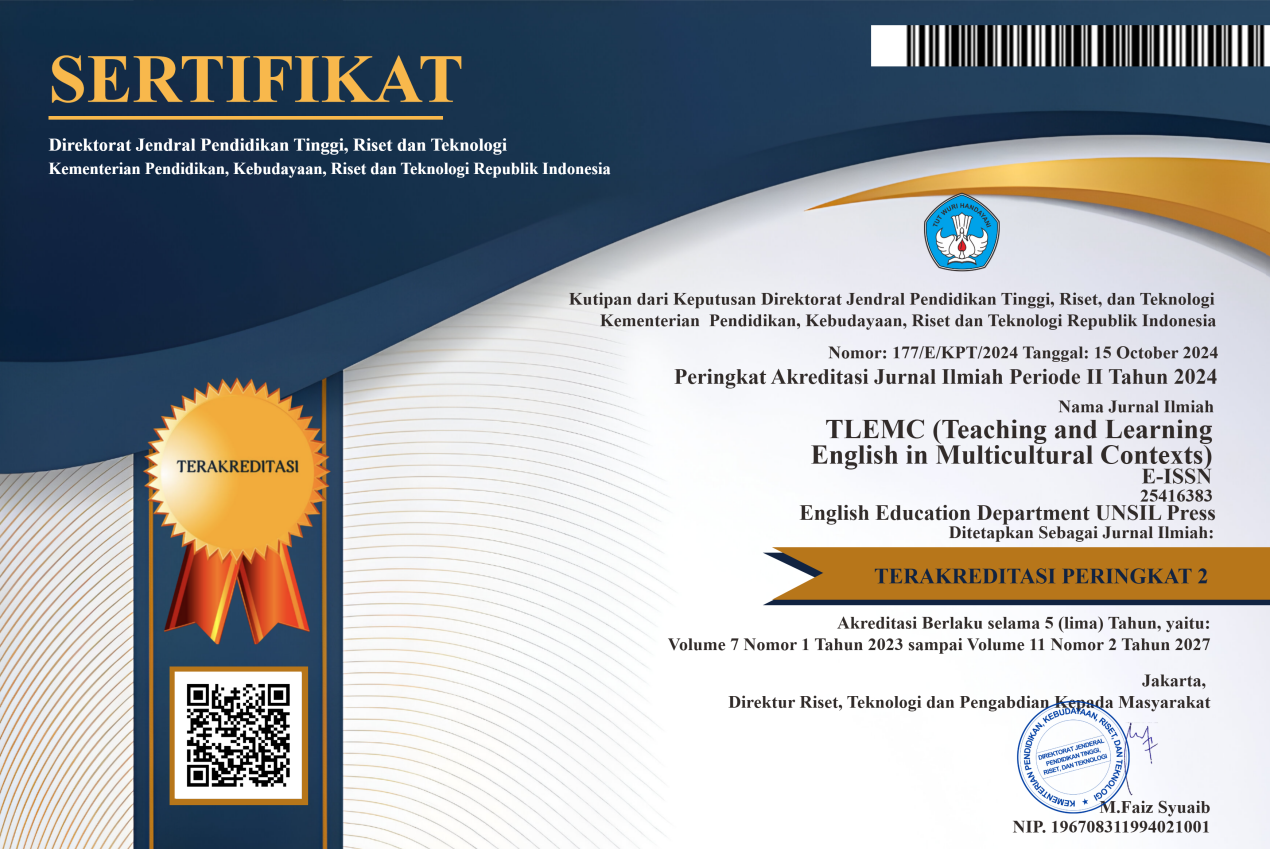Challenges of Online Teaching in Rural Area: What Have They Learned for Teacher Development?
Abstract
This study explored the perceived challenges of online learning encountered by teachers in rural areas. The students and teachers in rural areas often need more facilities and expertise to implement online education. This research's primary purpose is to examine the teacher's challenges and the impact of online learning on teachers' development in rural areas. Qualitative descriptive research is used as a research design to explore phenomena. Data were collected through interviews and participant observation and then analyzed using the data analysis thematic analysis (Creswell & Poth, 2018). The findings show that the teachers used technology to ensure the continuity of online learning. However, inadequate infrastructures, internet connections, and poor digital skills become the central problems in online learning. Thus, all stakeholders, such as teachers, students, parents, and the government, must adopt technology and improve their digital skills. Moreover, for the development of teachers, workshops, webinars, and so on are needed to facilitate, increase and enable teachers to make competent use of online learning as the teachers develop learning strategies in online education during Covid-19 and beyond.
Keywords: Teacher professional development, online learning, teacher development
Full Text:
PDFReferences
Abdo, M., & Semela, T. (2010). Teachers of poor communities: The tale of instructional media use in primary schools of Gedeo Zone, Southern Ethiopiaj. Australian Journal of Teacher Education (Online), 35(7), 78-92.
Bicaj, A., & Treska, T. (2014). The effect of teacher professional development in raising the quality of teaching (pilot research). Academic Journal of Interdisciplinary Studies, 3(6), 369.
Borg, W. R., & Gall, M. D. (1965). Educational research: An introduction. British Journal of Educational Studies, 14(1), 146. https://doi.org/10.2307/3119062
Cirocki, A., & Farrell, T. S. C. (2019). Professional development of secondary school EFL teachers: Voices from Indonesia. System, 85, 102111. https://doi.org/10.1016/j.system.2019.102111
Damschroder, L. J., Aron, D. C., Keith, R. E., Kirsh, S. R., Alexander, J. A., & Lowery, J. C. (2009). Fostering implementation of health services research findings into practice: a consolidated framework for advancing implementation science. Implementation science, 4(1), 1-15.
Darling-Hammond, L., & Hyler, M. E. (2020). Preparing educators for the time of COVID . . . and beyond. European Journal of Teacher Education, 43(4), 457–465. https://doi.org/10.1080/02619768.2020.1816961
Douglas, D. A. N., & Frazier, S. (2001). Teaching by principles: An interactive approach to language pedagogy: H. Douglas Brown. Wiley Online Library.
Espino-Díaz, L., Fernández-Caminero, G., Hernández-Lloret, C., González, H. G., & Álvarez-Castillo, J. (2020). Analyzing the impact of covid-19 on education professionals. toward a paradigm shift: ICT and neuroeducation as a binomial of action. Sustainability, 12(14), 5646. https://doi.org/10.3390/su12145646
Farrell, T. S. C. (2004). Reflecting on classroom communication in Asia. http://library.kysm.edu.my/index.php?p=show_detail&id=28253
Flores, M. A., & Swennen, A. (2020). The COVID-19 pandemic and its effects on teacher education. European Journal of Teacher Education, 43(4), 453–456. https://doi.org/10.1080/02619768.2020.1824253
Hargreaves, A. (2000). Four ages of professionalism and professional learning. Teachers and Teaching, 6(2), 151–182. https://doi.org/10.1080/713698714
Kozma, R. B. (2008). Comparative analysis of policies for ICT in education. International handbook of information technology in primary and secondary education, 1083-1096.
Lohman, M. C. (2000). Environmental inhibitors to informal learning in the workplace: A case study of public-school teachers. Adult Education Quarterly, 50(2), 83–101. https://doi.org/10.1177/07417130022086928
Mohammadi, M. R., & Moradi, K. (2017). Exploring change in EFL teachers’ perceptions of professional development. Journal of Teacher Education for Sustainability, 19(1), 22–42. https://doi.org/10.1515/jtes-2017-0002
Nunan, D. (1994). Research methods in language learning. TESOL Quarterly, 28(1), 212. https://doi.org/10.2307/3587215
Onyema, E. M., Eucheria, N. C., Obafemi, F. A., Sen, S., Atonye, F. G., Sharma, A., & Alsayed, A. O. (2020). Impact of Coronavirus pandemic on education. Journal of education and practice, 11(13), 108-121.
Rasmitadila, R., Aliyyah, R. R., Rachmadtullah, R., Samsudin, A., Syaodih, E., Nurtanto, M., & Tambunan, A. R. S. (2020). The perceptions of primary school teachers of online learning during the COVID-19 pandemic period. Journal of Ethnic and Cultural Studies, 7(2), 90-109.
Robbins, P. (1991). How to plan and implement a peer coaching program. Association for Supervision and Curriculum Development, 125 N. West Street, Alexandria, VA 22314-2798.
Selwyn, N. (2012). Education in a digital world. Routledge. https://doi.org/10.4324/9780203108178
Tamah, S. M., Triwidayati, K. R., & Utami, T. S. D. (2020). Secondary school language teachers’ online learning engagement during the COVID-19 pandemic in Indonesia. Journal of Information Technology Education: Research, 19, 803-832
Tarc, P. (2012). Full-time teachers’ learning: engagements and challenges. In Teacher learning and power in the knowledge society (pp. 87-108). Brill.
Valenduc, G., & Vendramin, P. (2016). Work in the digital economy: sorting the old from the new. ETUI Research Paper-Working Paper.
Watling, R., James, V., & Briggs, A. R. J. (2012). Qualitative data analysis: using NVivo. Research methods in educational leadership & management, 381-396.
Xue, Z. (2014, June). Dilemma of teachers’ professional development and protective countermeasures. In 3rd International Conference on Science and Social Research (ICSSR 2014) (1125-1130). Atlantis Press.
DOI: https://doi.org/10.37058/tlemc.v7i2.5993
Refbacks
- There are currently no refbacks.
INDEXED BY:
This work is licensed under a Creative Commons Attribution-NonCommercial-ShareAlike 4.0 International License.
![]()
TLEMC (Teaching and Learning English in Multicultural Contexts)
Program Studi Pendidikan Bahasa Inggris
Fakultas Keguruan dan Ilmu Pendidikan
Universitas Siliwangi
Jl. Siliwangi No. 24 Kota Tasikmalaya - 46115
email: tlemc@unsil.ac.id





